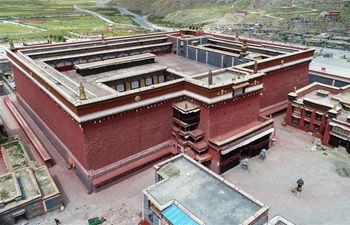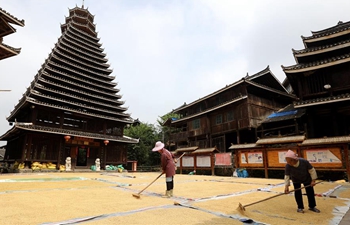by Chomba Musika
LUSAKA, Sept. 15 (Xinhua) -- Thanks to the new milling plants around, people in Lusaka, Zambia's capital, now have cheaper mealie-meal and more job opportunities.
What's more, the milling plants are solar-powered. The Zambians welcome the mills, a result of President Edgar Lungu's fruitful visit to China in March 2015.
They were built with loans from the China Development Bank and in total, about 2,000 solar milling plants are planned to be built in the small towns in Zambia. The project is expected to help with the landlocked African country's industrialization and job creation agenda.
The milling plants are expected to create about 3,000 jobs and help stabilize the price of mealie-meal, from which the Zambians prepare their staple food, nshima.
The Zambia Cooperative Federation (ZCF) is spearheading the construction of the solar-powered milling plants in the small towns under Lusaka, among them the densely-populated, low-income Bauleni and Mandevu.
The local residents are particularly happy with the milling plants because they no longer have to walk long distances to have their maize milled.
"I don't have to look for money for transport anymore to take my maize for milling because the plant is near my house," said Jane Jere, a Bauleni resident.
Martha Chisanga, another Bauleni resident, said the solar milling plants are more reliable than the hammer mill affected by an intermittent electricity supply.
"When we used to have seven hours of load shedding, we had problems to take our maize for milling. Sometimes you would go to the hammer mill and find that there is electricity," she said.
The milling plants are a job creation strategy which also supports the government plan to lower the mealie-meal price and ensure food security, said Mwamba Chileshe, a Mandevu resident.
According to Dominic Phiri, who is in charge of the milling plant at the Olympic Youth Development Center (OYDC), a 50 kg bag of the breakfast and roller meal are being sold at about 65 and 45 kwachas (6.5 and 4.5 U.S. dollars), respectively.
"The people in Mandevu who mill their maize from the OYDC plant are happy with this project because our 50 kilogram bags of mealie-meal are cheaper because, elsewhere, a 50 kilogram bag of mealie-meal is fetching between K75 and K80 (7.5 and 8.5 dollars)," Phiri said.
Apart from selling ready mealie-meal and milling maize to people, the milling plants also sell the byproduct bran to farmers as livestock feed.
So far, some 1300 solar milling plants have been built nationwide in Zambia, and the whole project is expected to be completed by December, according to the ZCF.
The milling plants are run by the local cooperatives. ZCF development officer Pumulo Kabalo said, "On average, each plant has at least three people working there."













